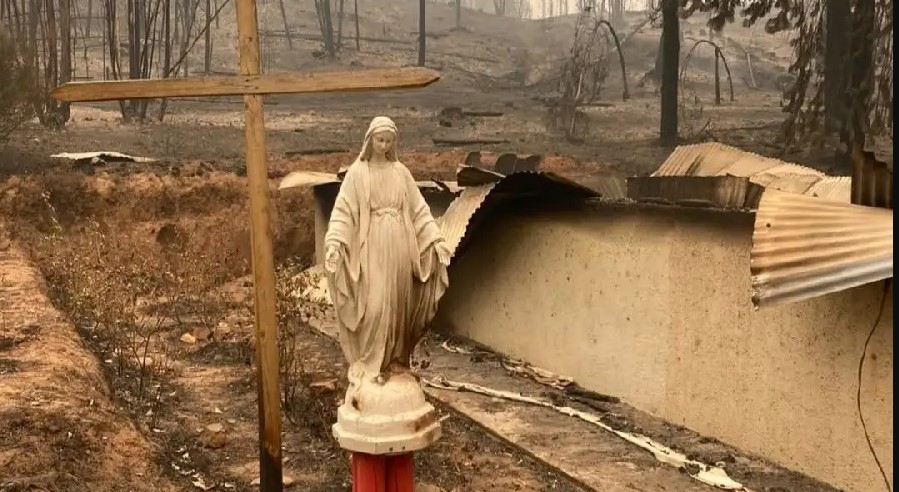At around midnight on Saturday, 4 March, eight masked and armed men arrived at the chapel of Our Lady of Rays, in the village of California, Araucanía, central Chile, and set it alight.
“The neighbours came out and watched in dismay as the building was reduced to ashes. They are very upset, they don’t understand the motives for the attack”, Magdalena Lira, national director of the Chilean branch of Aid to the Church in Need (ACN), explained.
According to the Chilean press, the attackers left pamphlets and a banner claiming the attack and warning about future violent actions. “Every bullet you fire will be returned. Temucuicui resists.” The message was signed RMM, which stands for the Malleco Mapuche Resistance, a guerrilla group that claims to defend the rights of the indigenous Mapuche people and has been responsible for other attacks in the past.
“The flames consumed the building in a matter of minutes, leaving the community, which is mostly made up of Mapuche families, without a place of worship for their activities. The small chapel had been built in 1952 by the same group of neighbours who now watched it be destroyed, hence the pain they felt as they watched it burn to the ground. The police only found remains of the metal roof, and the occasional ribbon that survived the fire, but there is little left to identify it as a religious building”, Lira says.
“By a small miracle a small plaster image of Mary, which for a long time had been kept in a nearby cave, was found intact”, adds the head of ACN Chile.
Church attacks on the rise in Chile
Regrettably, the incident at the chapel is only the latest in a series of attacks on sacred Christian sites in Chile. According to ACN’s Religious Freedom Report for 2021, 59 churches were damaged or vandalised across Chile between October 2019 and October 2020, six of these were Protestant, and 59 were Catholic. Although the figures have not been officially updated since then, it is widely recognised that the number has increased significantly.
“Many of these attacks occurred in October 2019, because of the civil unrest that took place in Chile at that time, but even before that there had been several attacks in the Araucanía area, linked to subversive groups that claim to defend the Mapuche, the indigenous people of this region. These are minority groups of violent radicals that do not represent the majority of the Mapuche”, Magdalena Lira points out.
“Some of these small groups, who resort to violence to call for land restitution, see Christianity as a symbol of colonisation, even though that is not the case. Many studies show that the majority of the Mapuche identify as Christian. They have a right to be respected in their faith and not have their religious freedom threatened. Many of these chapels were built with great effort by the communities, such as this one that was just burned. Can you imagine the pain and the helplessness of the community as they watched the fire destroy something that they built and cared for with such devotion? The church is not just walls, it holds the memory of a community that has lived its religious life around it”, she adds.
Dialogue as a path to justice
The attack on the chapel of Our Lady of Thunderbolts opens a new wound which adds to an already large list of chapels and religious buildings that have been destroyed in recent years by arson, and, in February of this year, by forest fires that tore across the region. Many communities now regret not having a place to meet to celebrate their faith.
The administrator of the Diocese of Temuco, Fr Juan Andrés Basly Erices, issued a public statement decrying the incident and calling for “peace and a calming of consciences, in the knowledge that violence never leads to anything”, and that “the situations of injustice that have taken place in Araucanía may be overcome through dialogue and solidarity”.
“As the People of God, we continue to pray for our faithful and their communities, we invoke the protection of Saint Joseph, patron saint of the diocese, on everybody at this time of Lent, and we invite everybody to conversion and to transform their hearts”, reads the statement.


